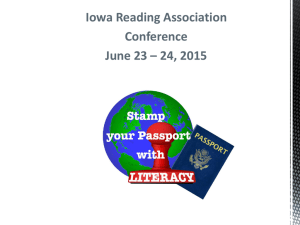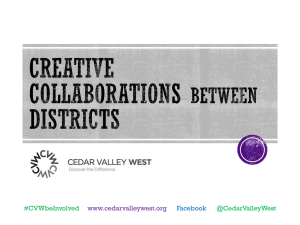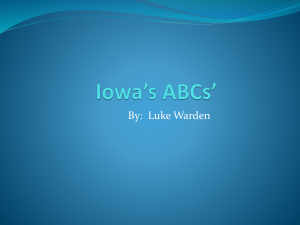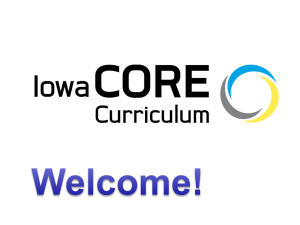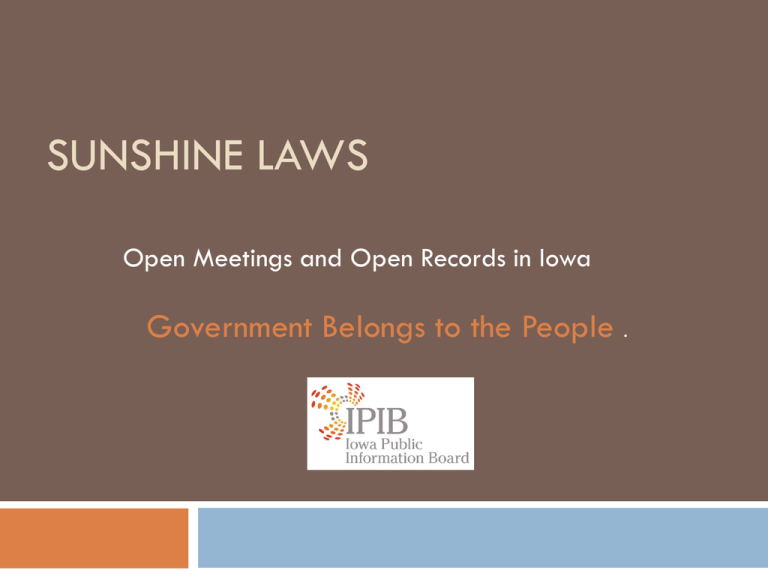
SUNSHINE LAWS
Open Meetings and Open Records in Iowa
Government Belongs to the People .
“Whenever the people are wellinformed, they can be trusted with their
own government.”
Thomas Jefferson
“The liberties of a people never were, nor ever
will be, secure, when the transactions of their
rulers may be concealed from them.”
Patrick Henry
“A popular government, without popular information,
or the means of acquiring it, is but a prologue to a
farce or a tragedy; or, perhaps both.”
James Madison
History
Presumption of Openness
“Ambiguity in the construction or
application of this chapter should be
resolved in
favor of openness.”
(Iowa Code Section 21.1)
History
First enacted July 1, 1967
Tweaked from the 1970’s on
Iowa Public Information Board
Created July 1, 2012 and activated July 1, 2013
To provide “an alternative means by which to secure compliance
with and enforcement of the requirements of chapters 21 and 22”
But to secure it in “an efficient, informal and cost-effective”
process
(Iowa Code Section 23.1)
OPEN MEETINGS 101
Defining a Government Body
Governmental Bodies are:
Boards, Councils and Commissions created by law or appointed by other governing
bodies such as city councils, county boards of supervisors, school boards (a,b,c)
Bodies created by the Board of Regents or a president of a university charged with
management or control of athletic programs at the state universities (d)
Advisory boards, advisory commissions and task forces created by state or local
governments to develop and make recommendations on public policy (e)
Non-profit corporations (other than a fair) who are supported with property tax revenue
and licensed to conduct pari-mutual betting (f)
Non-profit corporations licensed to conduct gambling games pursuant to chapter 99F
(g)
Governing bodies of drainage or levee districts (i)
Advisory boards, advisory commissions, advisory committees, task forces created through
28E agreements or by statute or executive order of state or subdivision to develop and
make recommendations on public policy (h,j)
Advisory boards of General Assembly and Governor by executive order (e)
(Section 21.2)
FAQ
Does the definition apply to all task forces, subcommittees, etc?
Yes, if membership includes a quorum of the main body, the group is likely to be
covered by the law.
Legal guidelines include the following“Advisory bodies created by school boards and county boards of supervisors and other
governmental agencies by executive order to develop and make recommendations on public
policy issues” are subject to the provisions of the open meetings law. (Tabor to Stilwill and
Sarcone, 93-11-5)
The Iowa Supreme Court has said that policy-making “is more than recommending or
advising what should be done. Policy-making is deciding with authority a course of action.”
Mason v. Vision Iowa Bd, 2005
If they are acting within scope of duty to develop and make recommendations Mason v.
Vision Iowa Bd.
Best Practices
While some ad hoc committees, advisory board or task forces may not be required
to be open, they are often encouraged to do so as a matter of good public policy.
Allowing the public to observe the deliberations will add to the “buy in” necessary
to enact any decision or recommendation made by the group.
Defining a Meeting
“…a gathering in person or by electronic means, formal or
informal, of a majority of the members of a governmental body
where there is deliberation or action upon any matter within the
scope of the governmental body’s policy–making duties.”
(Section 21.2 (2))
FAQ
Can members get together socially?
Yes, but they cannot discuss business. The Attorney General has said that a gathering
becomes a “meeting” when a quorum of officials engage in discussion on matters over
which they exercise judgment.
The purpose of the law is to allow citizens to see how their officials arrive at a decision.
Citizens need to see the discussion and hear the opinions. Even retreats are public
meetings if a quorum is present and policy is discussed.
FAQ
Can members e-mail each other concerning governmental
business?
Every situation is fact specific, and it is easy to send an e-mail to all members just to share relevant
information on a topic without the intent to avoid the Open Meetings Law. However, if members
want to share an opinion or debate policy, they should save that discussion for the open session.
Best Practices
Save discussion and opinion of any subject for open meetings.
Electronic communication concerning public business is a public record.
Note: Proposed legislation that would prohibit “walking quorums” – serial communication among
individual members of a government body, either in person or electronically, with the intent to skirt
the open meetings law – has been the topic of much discussion at the Statehouse in recent years.
FAQ
Do members of the public have the right to speak at an open
meeting?
While most bodies have a time noted on their agendas for public
comment, members of the public have no right to participate in the
discussion of an item unless they are on the agenda.
Preparing For a Meeting
Meetings must –
Be preceded by a public notice of at least 24 hours giving the date, time, place and a
tentative agenda.
Notice of the meeting must be sent to any news organization requesting it.
The notice must be posted in a prominent place accessible to the public at the
government office. If no office is available, notice should be prominently placed where
the meeting will be held.
(Sections 21.3, 21.4)
Best Practices
E-mail a copy to members of the public who request it and place it on your website.
Post any notice in an area, door, bulletin board, etc. where the public is most likely to
see it for at least 24 hours preceding a meeting. The posting should have continuous
access if at all possible.
FAQ
What needs to be included in the agenda?
Barebones agenda information such as “approval of old minutes, old business, new
business” would not be sufficient, nor would using the same agenda for meeting after
meeting.
Guidelines provided by the Iowa Supreme Court
(KCOB/KLVN v. Jasper County Board of Supervisors, 1991, and Barrett v. Lode, 1999):
The tentative agenda can be subject to change under certain circumstances.
The law allows discussion and action on emergency items, but if action can
reasonably be deferred to a later meeting, it should be.
The information on the agenda must be reasonably sufficient to alert interested
people as to the subject matter to be considered.
The agenda must specifically state any issues the board intends to discuss in open
or in closed sessions.
Minutes
Minutes should show, at a minimum, the date, time and place, the members present and
the action taken at any meeting. Votes by each member must be noted individually but
a unanimous vote can be so noted as long as all present vote. Minutes become public
record as soon as they are complete and must be published as required by law, in the
appropriate newspaper. Although not a substitute to publishing, minutes can also be
made available online.
(Section 21.3)
FAQ
Can secret or preliminary votes be taken?
No, all votes must be recorded.
Closed Sessions
Closed sessions may be held only by the vote in open session of two-thirds of the
members of the body or all members present and only after citing one of the following
reasonsTo review or discuss a record which is required or authorized by state or
federal law to be kept confidential or as a condition to retain federal
funding. (a)
To discuss application for a patent. (b)
To discuss strategy with counsel on matters that are currently or may
imminently be in litigation. (c)
To discuss contents of a licensing examination, initiate disciplinary
investigation or proceeding if the body is involved with licensing or examining.
(d)
Closed Sessions
To conduct a hearing or discuss whether to conduct a hearing to suspend or expel a student
unless the student and/or parent wants the meeting to remain open. (e)
To discuss the decision to be rendered in a contested case. (f)
To avoid disclosure of specific law enforcement matters which if disclosed would enable law
violaters to avoid detection or facilitate disregard of requirements imposed by law. (g,h)
To evaluate the professional competency of an individual whose appointment, hiring,
performance, or discharge is being considered. The individual must request a closed session.
(i)
To discuss the purchase or sale of real estate. The minutes and audio recording of the
closed session shall be made available when the transaction is dropped or completed. (j)
Noteworthy: this section may require an entity to retain the closed session records longer than
as required in 21.5
Closed Sessions
To discuss records concerning security procedures and emergency preparedness
for the protection of government employees, visitors, people under the care and
protection of the government and its property. (k)
To discuss patient care quality and process improvement initiatives in a meeting
of a public hospital that if disclosed might harm the hospital’s competitive position.
(l)
Other sections of the Iowa Code may permit a government agency to close a
meeting OR exempt meetings from the requirements of the open meetings law. (For
example, Ch. 279 exempts some meetings and records involving the termination of
a teacher from the sunshine laws.)
Procedure During Closed Session
No additional topics can be discussed.
The session must be recorded and “detailed minutes” must be taken. These records
must be retained for at least one year and are not public record. Members who would
have otherwise had access to the closed session may get access to the closed session
recording and minutes.
Final action must happen in open session.
But perhaps the most important thing to rememberNothing in this law requires a governmental body to hold a closed session to discuss or
act upon any matter.
(Section 21.5(5))
OPEN RECORDS 101
Definitions
All governmental bodies, officials and employees are covered by Chapter 22,
examination of public records.
Each body must designate a “lawful custodian” for its records and must publicly
announce who holds that responsibility.
The term “record” includes all documents, tape or other information stored or preserved
in any medium of or belonging to a governmental body. It also includes all records
relating to the investment of public funds. It includes electronic communication such as emails, websites or blogs.
FAQ
Who has the right to examine public records?
Anyone can examine, photograph or copy a public record without charge while the
public record is in the physical possession of the custodian.
The governmental body cannot prevent examination of the records by contracting with a
nongovernmental entity to create, hold or store those records. (Section 22.2 (6))
There are two exceptionsGovernmental bodies can control the terms and conditions of the examination of
non-confidential records stored within geographic computer databases. Bodies must
establish reasonable rates for the examination of these records. (Section 22.2(3)(a)
Data processing software. (Section 22.2(3)(b)
FAQ
When must records be made available?
During customary office hours of the lawful custodian.
If the custodian does not have customary office hours of at least thirty hours per week,
such rights “…may be exercised at any time from 9:00 a.m. to noon and from 1:00 p.m.
to 4:00 p.m. Monday through Friday, excluding legal holidays, unless the person
exercising such right and the lawful custodian agree on a different time.” (Section 22.4)
Confidential Records
There is a list of records that shall be kept confidential under 22.7 of the open records
law. Other sections of the Iowa Code and federal law also may contain provisions
mandating confidentiality. Know your records and the laws relating to them.
The most common confidential records areMedical records. (2)
Trade secrets protected by law. (Trade secrets are defined in Iowa Code Chapter 550),(3)
The work product of an attorney related to litigation by or against a public body. (4)
Peace officers’ investigative reports, except for date, time, specific location, and immediate
facts and circumstances surrounding a crime or incident. (5)
Appraisal information concerning the sale or purchase of property for public purposes
prior to announcement of the project. (7)
Confidential Records
Certain personal information such as age, race, sex, address and Social Security, home
telephone numbers, reason for sick leave held in confidential personnel records of government
employees. This does not include the dates and times of use of sick or vacation leave.
22.7(11) and (32)
Information that if released would cause the loss of federal funding (22.9)
Information submitted which is not required by law and submitted from someone outside
government, and the lawful custodian could reasonably believe those persons would be
discouraged from submitting. Unless the person consents to its release or the identifying
information can be redacted to keep the identity of the individual confidential. 22.7(18)
Confidential Records
In 2011, the Legislature amended Ch. 22.7(11) to require the following information to
be made public:
The name and detailed information about compensation of an employee,
including any written agreement about terms of employment. This covers anything
of value given to an employee, including pay, benefits, vacation, severance
payments and retirement benefits.
Employment dates, positions held, educational background and previous
employment.
The fact that the employee was discharged as the result of a disciplinary action.
In 2002, Legislature enacted several exemptions related to homeland security.
Confidential Records
The public records law allows the release of confidential information when “ordered by
a court, by the lawful custodian of the records, or by another person duly authorized to
release such information…”
Confidential Records
When a government entity is involved in a legal dispute, including an allegation that the
entity violated a rule or statute, after the dispute is resolved, the government body must
prepare a summary that indicates the identity of the parties involved, the nature of the
dispute and the terms of the settlement. This summary and the settlement agreement are
public records. (Section 22.13)
Records custodians can withhold “tentative, preliminary, draft, speculative, or research
material, prior to its completion for the purpose for which it is intended.” However, this
exception does not apply to public records that are actually submitted for use by
government bodies or that are used in the formulation, recommendation, adoption of
government policy or action. (22.7(65), effective July 1, 2013)
FAQ
How much time does a custodian have to respond to a record
request?
Most requests are routine and will be handled immediately or as soon as practically
possible.
However, a good faith delay is allowed to determine whether the record in question is a
public record or confidential. (Section 22.8(4))
A reasonable delay for this purpose ordinarily should not exceed 10 business days and
cannot exceed 20 calendar days. (Section 22.8(4))
Record custodians should work with requesters to ensure that the correct records are
released in as timely a manner as possible.
FAQ
What about records held on databases?
While the software used to run a database is confidential, the records contained on a
database can be open or a combination of open and closed.
Records cannot be withheld because they contain both non-confidential and confidential
material. Bodies cannot acquire any system that impairs the examination of a public
record and therefore need to find a way to remove or redact confidential material from
any record requested. (Section 22.3A(2))
.
Supervision and Fees
Record requests do not have to be made in person; officials shall fulfill requests made in
writing, by telephone or by electronic means.
Examination and copying shall be done under the supervision of the record custodian;
the custodian should not relinquish control of the records. (1982 Op. Att’y. Gen. 76)
The lawful custodian shall adopt reasonable rules to safeguard the records.
The custodian shall provide a suitable place for the work or move to a separate
location, if necessary.
The custodian shall provide a reasonable number of copies. Most governmental bodies
fulfill a simple request for free.
Supervision and Fees
The lawful custodian may charge a reasonable fee for the services of the custodian and
for the copies. Any fees should be applied uniformly.
Fulfillment of a request may be made contingent upon payment of a fee and estimated
expenses shall be communicated to the requestor.
Fees cannot exceed the actual cost of providing the service and cannot include the costs
of ordinary expenses such as employment benefits, depreciation, maintenance,
electricity or insurance associated with the administration of the office.
Data Manipulation
“If it is necessary to separate a public record from data processing software in order to
permit the examination or copying of the public record, the government body shall bear
the cost of separation of the public record…” (Section 2.3A(2))
However…”The amount charged for access to a public record shall be not more than
that required to recover direct publication costs, including but not limited to editing,
compilation, and media production costs, incurred by the government body in
developing the data processing software and preparing the data processing software
for transfer to the person.” (Section 22.3A(2))(a))
“The government body shall, if requested, provide documentation which explains and
justifies the amount charged.” (Section 22.3A(2)(a))
Fair Information Practices
State agencies are required and local governments are strongly encouraged to create
an information policy that includes the followingThey must be clearly defined and subject to public review and comment.
The nature and extent of the personally identifiable information collected, its
legal authority to do so, and a description of how it will be stored. (Section 22.11(1)(a))
A description of which of its records are public, confidential or a combination of
the two. (Section 22.11(1)(b))
Procedure for providing access to the public records. (Section 22.11(1)(c))
A procedure to allow a person to review the records about that person and have
additions, dissents or objections entered in that record unless the review is
prohibited by statute. (Section 22.11(1)(d))
Fair Information Practices
A procedure where the subject of a confidential record can have the record
released to a named third party. (Section 22.11 (1)(e))
A procedure that notifies the persons supplying information to the agency of its
use. (Section 22.11 (1)(f))
Whether a data processing system matches, collates, or permits the comparison
of personally identifiable information in one record system with personally
identifiable information in another record system. (Section 22.11 (1)(g))
Fair Information Practices
Other bodies that are not state agencies may choose to adopt this practice, but the
policies must be adopted by the elected governing body, and the policies, if adopted
by the elected governing body, must be kept in certain offices of that body.
(Section 22.12)
Penalties
The law provides for civil lawsuits.
A court can issue an injunction ordering a government body to comply, assess damages
between $100 and $500, order payment of costs and attorney fees, and remove repeat
violators from office. (Section 22.10(3))
If a member of a governmental body knowingly participated in a violation, damages
increase to $1,000-$2,500. (Section 22.10(3)(b))
Ignorance of the law is not a defense, but damages will not be assessed against officials
who voted against the violation, refused to participate in the violation, engaged in efforts to
resist the violation, or relied upon a formal opinion of the attorney general, or the advice of
an attorney provided in writing or memorialized in a meeting. Government officials who rely
on advice from the Iowa Public Information Board are also protected. (Section 22.10(3)(b))
The Iowa Public Information Board
The Iowa Public Information Board provides an official, efficient and free legal resource
for citizens and government officials with questions about Iowa open meetings and
records laws, and for citizens with complaints about alleged violations of the laws. The
board is also one of the few such agencies in the nation with the authority to not only
advise but to enforce the state sunshine laws.
Iowa Code Section 23
The Iowa Public Information Board
The nine board members are appointed by the governor subject to confirmation by the
Iowa Senate. No more than three members shall represent the media, and not more than
three represent cities, counties or other local governments. The members serve staggered
four-year terms, and the board is balanced by political party and gender. The board
appoints a chair from among its members, and it is authorized to hire at least one
employee, an attorney who serves as executive director.
The board is an independent agency.
Iowa Code Section 23
The Iowa Public Information Board
The board is authorized by statute 23.6 …
To issue advice, or declaratory orders with the force of law, regarding the
applicability of the open records and open meetings laws.
To receive and investigate complaints alleging violations of the laws and seek
resolution through informal assistance, mediation and settlement.
If a complaint cannot be resolved informally, and the board has probable cause
to believe the law has been violated, to prosecute the government body or official
in a contested-case proceeding under the Administrative Procedures Act.
Iowa Code Section 23
The Iowa Public Information Board
The board is authorized by statute 23.6 …
To issue subpoenas to investigate complaints and prosecute cases, and to issue
orders with the force of law to require compliance with the sunshine laws.
To offer training in Chapters 21 and 22 to government bodies, to disseminate
information to the public, and to submit an annual report to the governor and
Legislature, making recommendations relating to access to government information.
Iowa Code Section 23
The Iowa Public Information Board
The board does not have jurisdiction over the judicial or legislative branches, or over the
governor and governor’s office. 23.12
The board also is limited to addressing issues involving Chapters 21 and 22 of the Iowa
Code 23.1
Complaints must be made within 60 days of the alleged violation of those laws 23.7 (1)
Declaratory orders issued by the board, determining the applicability of the open
meetings or records law to specific fact situations, have the force of law.
Iowa Code Section 23
The Iowa Public Information Board
Amendments to both Chapter 21 and 22 provide protection to government officials who
rely on written advice of the Public Information Board, the attorney general or the
government body’s attorney.
The board can assess damages, void action taken in violation of the open meetings law,
and require a government body or official to take any appropriate remedial action.
23.10(3)(b)
The board does not have the authority to unilaterally remove a person from office, but it
may file an action to remove someone from office under Chapters 21 or 22, which
include “two strikes and you’re out” provisions that direct the court to order the removal
of an official upon his or her second violation during a term. 23.10(3)(c)
Iowa Code Section 23
The Iowa Public Information Board
Any person, the attorney general or county attorney seeking to enforce open meetings
and records laws can bring the complaint before the board, or the individual can bring
an action in state district court, as under current law. If more than one party
simultaneously brings an action before the board and in court, the court shall stay the
case pending resolution of the complaint by the board. A final board order is subject to
judicial review. 23.5
Iowa Code Section 23
To repeat-
“Ambiguity in the construction or
application of this chapter should be
resolved in favor of openness.”
Suggested Iowa Resources
Iowa Public Information Board
Website www.ipib.iowa.gov ;
email IPIB@iowa.gov or phone 515-725-1781
The attorney for the government body or government association
The county attorney
Suggested Iowa Resources
Iowa Office of Ombudsman: 888-426-6283. www.legis.iowa.gov/ombudsman
Office of the Iowa Attorney General: 515-281-5165 or
www.IowaAttorneyGeneral.gov . The Attorney General’s website also includes
copies of the office’s “Sunshine Advisories” on open meetings and records issues,
and outlines of Chapters 21 and 22 with applicable case and AG’s opinion
citations.
The Iowa Freedom of Information Council: Kathleen Richardson, executive
director; 515-271-2295 or kathleen.richardson@drake.edu; www.ifoic.org
Suggested Iowa Resources
Iowa League of Cities: 515-244-7282 or www.iowaleague.org
Iowa State Association of Counties: 515-244-7181 or www.iowacounties.org
Iowa Association of School Boards: 1-800-795-4272 or www.ia-sb.org
Iowa judicial branch: www.judicial.state.ia.us
Iowa Newspaper Association (INA): 515-244-2145 www.inanews.com


